|
|
|
Sort Order |
|
|
|
Items / Page
|
|
|
|
|
|
|
| Srl | Item |
| 1 |
ID:
128387
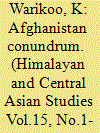

|
|
|
|
|
| Publication |
2011.
|
| Summary/Abstract |
Located at the crossroads of Central, South and West Asia and sharing. its borders with Central Asian Republics of Tajikistan, Uzbekistan and Turkmenistan on the north, Chinese province of Xinjiang in the east, [ran on the west and south west, and Pakistan and Pak-occu pied Kashmir on the south and south east, Afghanistan occupies a unique geo-strategic placement in the region. Distinct ethno-linguistic groups settled in different parts of .»'\fghanistan have diverse social moorings and political affiliations and aspirations. Th us the 'I'ajil
|
|
|
|
|
|
|
|
|
|
|
|
|
|
|
|
| 2 |
ID:
130201
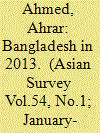

|
|
|
|
|
| Publication |
2014.
|
| Summary/Abstract |
Bangladesh in 2013 exhibited intense political polarization that was both frustrating and ominous. Several factors exacerbated political tensions in the country including the war crimes trial and disagreements relating to the caretaker government. Judgments and rulings by the courts also fed the forces of political turmoil. The economic situation was relatively good but faced increasingly difficult challenges. In terms of international relations, particularly with India and the U.S., the year was unproductive.
|
|
|
|
|
|
|
|
|
|
|
|
|
|
|
|
| 3 |
ID:
165410


|
|
|
|
|
| Summary/Abstract |
We report the results of a laboratory experiment based on a citizen–candidate model with private information about ideal points. Inefficient political polarization is observed in all treatments; that is, citizens with extreme ideal points enter as candidates more often than moderate citizens. Second, less entry occurs, with even greater polarization, when voters have directional information about candidates’ ideal points, using ideological party labels. Nonetheless, this directional information is welfare enhancing because the inefficiency from greater polarization is outweighed by lower entry expenses and better voter information. Third, entry rates are decreasing in group size and the entry cost. These findings are all implied by properties of the unique symmetric Bayesian equilibrium cutpoint pair of the entry game. Quantitatively, we observe too little (too much) entry when the theoretical entry rates are high (low). This general pattern of observed biases in entry rates is implied by logit quantal response equilibrium.
|
|
|
|
|
|
|
|
|
|
|
|
|
|
|
|
| 4 |
ID:
137705
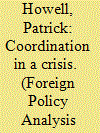

|
|
|
|
|
| Summary/Abstract |
This article explores possible theories of international economic policy coordination, and then proceeds to test these theories through a qualitative analysis of four EU member states – Germany, France, Belgium, and the Netherlands – and their preferences and experiences during the financial market crisis period of Fall/Winter 2008–2009. Both institutional and basic realist theories for coordination preferences are evaluated for explanatory power against the case of the 2008 financial crisis and are found lacking. Instead, this analysis finds that a comparative foreign policy theory of political constraints – institutional design, political polarization, and leader time horizons – emerges as the best fit for explaining the divergence in foreign policies among these EU member states.
|
|
|
|
|
|
|
|
|
|
|
|
|
|
|
|
| 5 |
ID:
111225
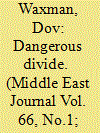

|
|
|
|
|
| Publication |
2012.
|
| Summary/Abstract |
This article examines the relations between Jewish and Palestinian-Arab citizens of Israel since the events of October 2000, when massive Arab protests and riots took place and thirteen Arab demonstrators were killed. In the decade since then Arab-Jewish relations have been characterized by growing mutual mistrust, fear, and hostility. Together with these negative attitudes, political polarization between the two communities has also increased. This poses a serious threat to Arab-Jewish coexistence in Israel and to Israeli democracy itself.
|
|
|
|
|
|
|
|
|
|
|
|
|
|
|
|
| 6 |
ID:
071715
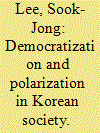

|
|
|
|
|
| Publication |
2006.
|
| Summary/Abstract |
This article identifies and analyzes economic and political factors behind the polarization of Korean civil society. Both the growing economic disparity between the rich and the poor and the tightened job market for the younger generation since the 1997-1998 financial crisis have contributed to a sharp divergence in views on how best to approach reforms. More importantly, political flux and instability deriving from the current "transitional politics" have aggravated the political polarization. The three major actors in this transitional politics-power elites, civic movement organizations, and the media-play a divisive rather than unifying role. Given that political institutions are still weak and a political culture for compromise remains largely absent, polarization of Korean society is likely to continue until the intense passions of the politicized civil society are dampened by successful institutionalization of conflict resolving mechanisms.
|
|
|
|
|
|
|
|
|
|
|
|
|
|
|
|
| 7 |
ID:
184757
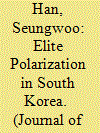

|
|
|
|
|
| Summary/Abstract |
This study analyzes political polarization among the South Korean elite by examining 17 years’ worth of subcommittee meeting minutes from the South Korean National Assembly's standing committees. Its analysis applies various natural language processing techniques and the bidirectional encoder representations from the transformers model to measure and analyze polarization in the language used during these meetings. Its findings indicate that the degree of political polarization increased and decreased at various times over the study period but has risen sharply since the second half of 2016 and remained high throughout 2020. This result suggests that partisan political gaps between members of the South Korean National Assembly increase substantially.
|
|
|
|
|
|
|
|
|
|
|
|
|
|
|
|
| 8 |
ID:
171346
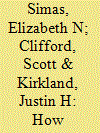

|
|
|
|
|
| Summary/Abstract |
Over the past two decades, there has been a marked increase in partisan social polarization, leaving scholars in search of solutions to partisan conflict. The psychology of intergroup relations identifies empathy as one of the key mechanisms that reduces intergroup conflict, and some have suggested that a lack of empathy has contributed to partisan polarization. Yet, empathy may not always live up to this promise. We argue that, in practice, the experience of empathy is biased toward one’s ingroup and can actually exacerbate political polarization. First, using a large, national sample, we demonstrate that higher levels of dispositional empathic concern are associated with higher levels of affective polarization. Second, using an experimental design, we show that individuals high in empathic concern show greater partisan bias in evaluating contentious political events. Taken together, our results suggest that, contrary to popular views, higher levels of dispositional empathy actually facilitate partisan polarization.
|
|
|
|
|
|
|
|
|
|
|
|
|
|
|
|
| 9 |
ID:
097756
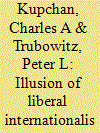

|
|
|
|
|
| Publication |
2010.
|
| Summary/Abstract |
Over the past two decades, political polarization has shaken the domestic foundations of U.S. grand strategy, sorely testing bipartisan support for liberal internationalism. Stephen Chaudoin, Helen Milner, and Dustin Tingley take issue with this interpretation, contending that liberal internationalism in the United States is alive and well. Their arguments, however, do not stand up to careful scrutiny. Their analysis of congressional voting and public opinion fails to demonstrate the persistence of bipartisanship on foreign policy. Indeed, the partisan gap that widened during George W. Bush's administration has continued during the presidency of Barack Obama, confirming that a structural change has taken place in the domestic bases of U.S. foreign policy. President Obama now faces the unenviable challenge of conducting U.S. statecraft during an era when consensus will be as elusive at home as it is globally.
|
|
|
|
|
|
|
|
|
|
|
|
|
|
|
|
| 10 |
ID:
165862
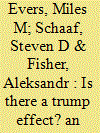

|
|
|
|
|
| Summary/Abstract |
Does President Trump face domestic costs for foreign policy inconsistency? Will co-partisans and opposition-partisans equally punish Donald Trump for issuing flippant international threats and backing down? While the president said he could “stand in the middle of Fifth Avenue and shoot somebody” without losing voters, the literature consistently shows that individuals, regardless of partisanship, disapprove of leaders who jeopardize the country’s reputation for credibility and resolve. Given the atypical nature of the Trump presidency, and the severe partisan polarization surrounding it, we investigate whether the logic of audience costs still applies in the Trump era. Using a unique experiment fielded during the 2016 presidential transition, we show that Republicans and Democrats impose equal audience costs on President Trump. And by varying the leader’s identity, between Donald Trump, Barack Obama, and “The President,” we demonstrate that the public adheres to a non-partisan logic in punishing leaders who renege on threats. Yet we also find Presidents Trump and Obama can reduce the magnitude of audience costs by justifying backing down as being “in America’s interest.” Even Democrats, despite their doubts of Donald Trump’s credibility, accept such justifications. Our findings encourage further exploration of partisan cues, leader-level attributes, and leader-level reputations.
|
|
|
|
|
|
|
|
|
|
|
|
|
|
|
|
| 11 |
ID:
127168
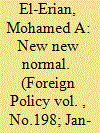

|
|
|
| 12 |
ID:
115277
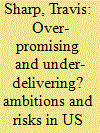

|
|
|
|
|
| Publication |
2012.
|
| Summary/Abstract |
Recent changes to US defence strategy, plans and forces have placed the United States at greater risk of over-promising and under-delivering on its global security ambitions. In 2012, the Obama administration released a new defence strategic guidance document to adapt to a shifting security environment and defence budget cuts. The guidance upholds the two long-standing American goals of global pre-eminence and global reach, but seeks to apply this military power by using new planning and regional concepts. It revises the Department of Defense's force planning construct, an important tool used to size US military forces, and identifies the Asia-Pacific and the greater Middle East as the two regions where the US military should focus its attention and resources. There are three major risks facing this revised US strategy: emerging security threats, the role of US allies and partners, and domestic constraints in the United States. Included in these risks are the proliferation of advanced military technologies, the US response to the rise of China, the continued prevalence of state instability and failure, the capability and commitment of NATO and other US allies, additional US budget cuts, political polarization in the United States, and interservice competition within the US military. In light of these risks, the United States faces a future in which it will continue to struggle to direct its military power towards its most important geopolitical priorities, such as rebalancing towards the Asia-Pacific, as opposed simply to respond to the many security surprises that are certain to arise. If the past is any guide, American political leaders will respond to the aforementioned risks in the worst way possible: by maintaining the current US defence strategy while slashing the resources to support it.
|
|
|
|
|
|
|
|
|
|
|
|
|
|
|
|
| 13 |
ID:
132200
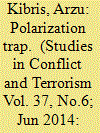

|
|
|
|
|
| Publication |
2014.
|
| Summary/Abstract |
This article studies the association between ethnic conflicts and political attitudes. It employs a new data set on the casualties of the ethnic conflict in Turkey to identify the effects of the Kurdish insurgency on the electoral behavior of the Turkish voters. The results indicate that the conflict leads to the political polarization of the society along ethnic nationalist lines. Further investigation of the data also provides some empirical support for the constructivist argument that the salience of ethnic identities is subject to change in response to external stimuli, of which ethnic conflict constitutes a drastic example.
|
|
|
|
|
|
|
|
|
|
|
|
|
|
|
|
| 14 |
ID:
100770
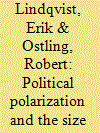

|
|
|
|
|
| Publication |
2010.
|
| Summary/Abstract |
In this article, we study the relationship between political polarization and public spending using the dispersion of self-reported political preferences as our measure of polarization. Political polarization is strongly associated with smaller government in democratic countries, but there is no relationship between polarization and the size of government in undemocratic countries. The results are robust to a large set of control variables, including gross domestic product per capita and income inequality.
|
|
|
|
|
|
|
|
|
|
|
|
|
|
|
|
| 15 |
ID:
177414
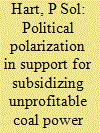

|
|
|
|
|
| Summary/Abstract |
Coal power plant-based energy production has declined dramatically since 2011, leading to calls from some politicians for government subsidies to support unprofitable coal power plants. This study is the first to use a nationally representative sample to assess American public support for subsidizing coal power plants. We find moderate public opposition overall along with a partisan divide, with liberal opposition and conservative support. In addition, messages that frame coal subsidies as contributing to air pollution vs. climate change do not have a differential effect on policy support, nor is there moderation by political ideology on the message frame. Finally, the level of political polarization around subsidizing coal power plants is similar in magnitude to public polarization around whether climate change should be a national priority - one of the most polarizing issues today. Overall, results suggest that policy proposals to subsidize coal power production, regardless of how they are framed, are likely to be acceptable to conservatives but draw liberal opposition.
|
|
|
|
|
|
|
|
|
|
|
|
|
|
|
|
| 16 |
ID:
114783
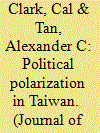

|
|
|
|
|
| Publication |
2012.
|
| Summary/Abstract |
This article argues, that the bitter division between the two major parties in Taiwan is not really reflected in the electorate, despite an increasing polarization of politics in Taiwan over the national identity issue. The authors seek to explain this paradox by examining the changing nature of political parties, in particular the growing role of ideological activists in campaigns, the rise of cultural and identity issues, the difficulty for new parties to emerge, the decline of catch-all parties, and the tendency for major parties to engage in cartel activities.
|
|
|
|
|
|
|
|
|
|
|
|
|
|
|
|
| 17 |
ID:
151343
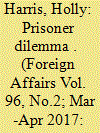

|
|
|
|
|
| Summary/Abstract |
During the past decade, a time of intense political polarization in the United States [2], criminal justice reform has emerged as an unlikely unifier. Democrats and Republicans have reached across the aisle, compelled by a shared recognition that flawed legal codes and sentencing laws (among other features of the criminal justice system) have destroyed lives, drained billions of taxpayer dollars, and failed to provide Americans with the public safety they deserve. This broad agreement led to the introduction, in 2015 and 2016, of bipartisan legislation in the U.S. Congress [3] that would have produced comprehensive reform at the federal level—including changes to mandatory minimum sentencing laws, which have contributed to the explosion in U.S. incarceration rates by reducing judges’ discretion in sentencing.
|
|
|
|
|
|
|
|
|
|
|
|
|
|
|
|
| 18 |
ID:
197504


|
|
|
|
|
| Summary/Abstract |
Are we, in 2024, navigating a world without American leadership or a world with contested leadership? Regardless of the winner in the US elections this autumn, contested leadership for influence in international affairs is sure to continue. If the United States fails to lead, little will stand in the way of Putin's vision of a new multipolar world where Russia, as an exceptional power pursues the domination of a natural sphere of geographic influence that extends beyond Ukraine, well into Europe.
|
|
|
|
|
|
|
|
|
|
|
|
|
|
|
|
| 19 |
ID:
113560
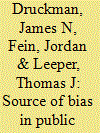

|
|
|
|
|
| Publication |
2012.
|
| Summary/Abstract |
A long acknowledged but seldom addressed problem with political communication experiments concerns the use of captive participants. Study participants rarely have the opportunity to choose information themselves, instead receiving whatever information the experimenter provides. We relax this assumption in the context of an over-time framing experiment focused on opinions about health care policy. Our results dramatically deviate from extant understandings of over-time communication effects. Allowing individuals to choose information themselves-a common situation on many political issues-leads to the preeminence of early frames and the rejection of later frames. Instead of opinion decay, we find dogmatic adherence to opinions formed in response to the first frame to which participants were exposed (i.e., staunch opinion stability). The effects match those that occur when early frames are repeated multiple times. The results suggest that opinion stability may often reflect biased information seeking. Moreover, the findings have implications for a range of topics including the micro-macro disconnect in studies of public opinion, political polarization, normative evaluations of public opinion, the role of inequality considerations in the debate about health care, and, perhaps most importantly, the design of experimental studies of public opinion.
|
|
|
|
|
|
|
|
|
|
|
|
|
|
|
|
| 20 |
ID:
190032
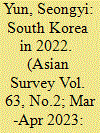

|
|
|
|
|
| Summary/Abstract |
At the presidential and local levels, progressives were replaced by conservatives in 2022. But the National Assembly is still dominated by the opposition Democratic Party, so the government is more divided than ever. As a conservative government came into power in South Korea, North Korea fired the most missiles ever, and inter-Korean relations were very strained. The economy is in serious condition due to inflation, interest rate hikes, and slowing growth.
|
|
|
|
|
|
|
|
|
|
|
|
|
|
|
|
|
|
|
|
|